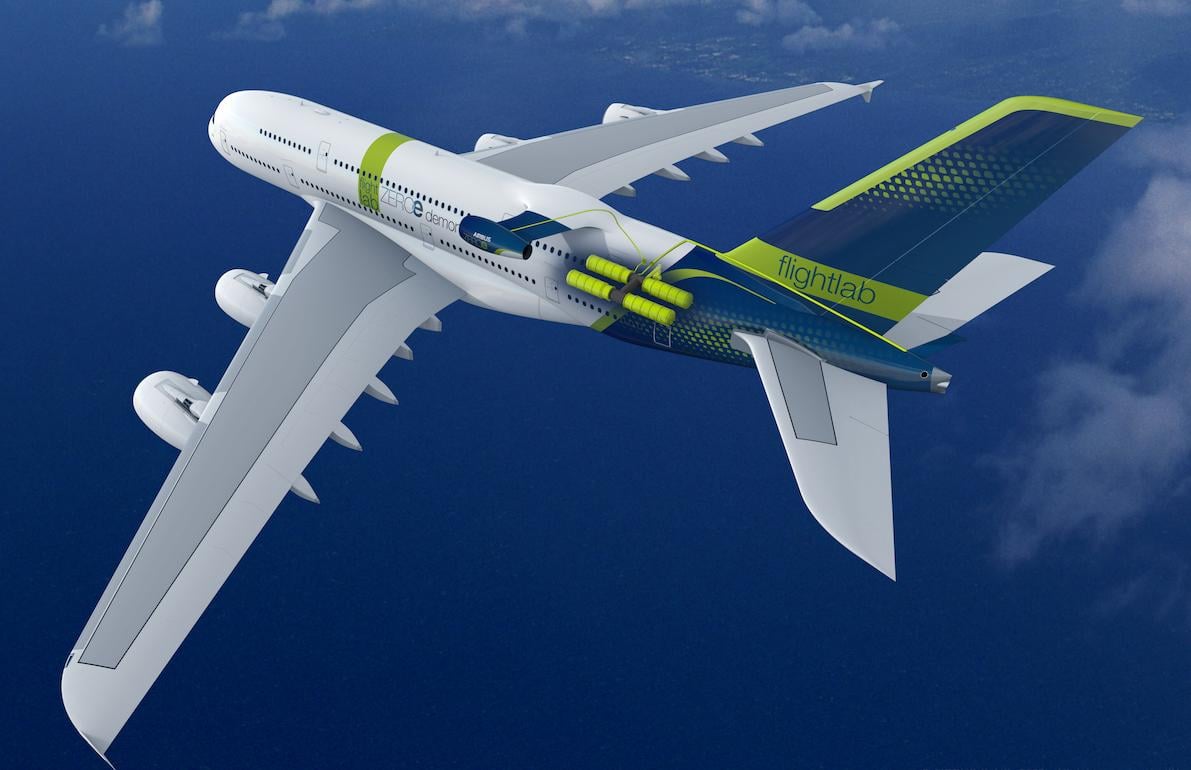
Airbus plans to flight-test a hydrogen-combustion turbofan on a modified A380.
Europe’s Clean Aviation research program has called for additional proposals for projects to mature technologies for hydrogen-powered aircraft.
The second call includes €65 million ($70 million) in EU funding for six topics relating to hydrogen.
Clean Aviation provided more than €700 million in funding for 20 projects after its first call for proposals. Work on these projects began in January and include development of technology for direct combustion of hydrogen in turbine engines, multi-megawatt fuel cell systems and lightweight liquid-hydrogen (LH2) tanks.
Projects include the €24 million Cavendish, led by Rolls-Royce Deutschland, to modify a Pearl 15 turbofan with lean-burn hydrogen combustion and integrate it with a fuel cell for a full-scale ground test in 2024. Hydea, led by Avia Aero, will modify GE Aerospace’s Passport 20 turbofan to hydrogen combustion for ground test by 2026, ready for flight testing on Airbus’ A380 testbed.
Newborn is an €83 million project led by Honeywell to ground test a 1-megawatt hydrogen fuel-cell propulsion system for Part 25 transport-category regional aircraft by 2026. Sweden’s PowerCell will develop a 300-kW fuel-cell stack with improved efficiency, temperature and weight under the project.
H2elios, a €25 million project led by Spanish aerostructures company Aciturri, will develop a lightweight LH2 tank that can be integrated into the structure of the aircraft with the fuselage skin acting as the outer wall of the cryogenic tank. This will increase the ratio of fuel to system weight. A tank with 150 kg (330 lb.) capacity will be ground tested, paving the way for flight tests of a 600-kg-capacity tank.
Two projects, both led by Slovenia-based Pipistrel, are focused on smaller Part 23 aircraft and uncrewed air vehicles. FlHYing Tank is a €7.5 million project to flight-test a 1,000-liter (264-gal.) LH2 tank in 2025. Hypotrade (Hydrogen Fuel Cell Electric Power Train Demonstration) is a €10 million project to ground test a full-scale 500-kW integrated propulsion system in 2025.
Topics for the second call include development of an aircraft LH2 distribution system and engine hydrogen fuel system for direct-burn engine ground-testing in preparation for flight testing in Phase 2. Clean Aviation also is seeking proposals to develop and ground-test a 3-megawatt-class integrated fuel-cell propulsion system for regional aircraft.
As fuel tanks will need to be installed in the fuselage and not the wing as in current aircraft, other topics include development of an ultra-efficient dry wing with unducted engines for short/medium-range aircraft and a cabin design that enables safe and optimum integration of hydrogen system components into the fuselage.
Proposals are also sought for development of a climate and aircraft technology impact-monitoring methodology that will enable the Clean Aviation program to obtain a preliminary assessment of the expected impact of the various technology development projects.
A related topic for which proposals are sought is delivery of an “ultra-advanced flight-test demonstrator platform” that will enable full-scale flight tests of ducted or unducted geared engine architectures for short/medium-range aircraft in Phase 2 of Clean Aviation. Proposals for all second-call topics are due by May 11.
